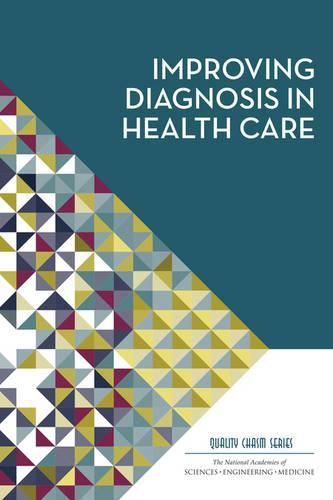Readings Newsletter
Become a Readings Member to make your shopping experience even easier.
Sign in or sign up for free!
You’re not far away from qualifying for FREE standard shipping within Australia
You’ve qualified for FREE standard shipping within Australia
The cart is loading…






Getting the right diagnosis is a key aspect of health care - it provides an explanation of a patient’s health problem and informs subsequent health care decisions. The diagnostic process is a complex, collaborative activity that involves clinical reasoning and information gathering to determine a patient’s health problem. According to Improving Diagnosis in Health Care, diagnostic errors-inaccurate or delayed diagnoses-persist throughout all settings of care and continue to harm an unacceptable number of patients. It is likely that most people will experience at least one diagnostic error in their lifetime, sometimes with devastating consequences. Diagnostic errors may cause harm to patients by preventing or delaying appropriate treatment, providing unnecessary or harmful treatment, or resulting in psychological or financial repercussions. The committee concluded that improving the diagnostic process is not only possible, but also represents a moral, professional, and public health imperative.
Improving Diagnosis in Health Care, a continuation of the landmark Institute of Medicine reports To Err Is Human (2000) and Crossing the Quality Chasm (2001), finds that diagnosis-and, in particular, the occurrence of diagnostic errors?has been largely unappreciated in efforts to improve the quality and safety of health care. Without a dedicated focus on improving diagnosis, diagnostic errors will likely worsen as the delivery of health care and the diagnostic process continue to increase in complexity. Just as the diagnostic process is a collaborative activity, improving diagnosis will require collaboration and a widespread commitment to change among health care professionals, health care organizations, patients and their families, researchers, and policy makers. The recommendations of Improving Diagnosis in Health Care contribute to the growing momentum for change in this crucial area of health care quality and safety.
$9.00 standard shipping within Australia
FREE standard shipping within Australia for orders over $100.00
Express & International shipping calculated at checkout
Getting the right diagnosis is a key aspect of health care - it provides an explanation of a patient’s health problem and informs subsequent health care decisions. The diagnostic process is a complex, collaborative activity that involves clinical reasoning and information gathering to determine a patient’s health problem. According to Improving Diagnosis in Health Care, diagnostic errors-inaccurate or delayed diagnoses-persist throughout all settings of care and continue to harm an unacceptable number of patients. It is likely that most people will experience at least one diagnostic error in their lifetime, sometimes with devastating consequences. Diagnostic errors may cause harm to patients by preventing or delaying appropriate treatment, providing unnecessary or harmful treatment, or resulting in psychological or financial repercussions. The committee concluded that improving the diagnostic process is not only possible, but also represents a moral, professional, and public health imperative.
Improving Diagnosis in Health Care, a continuation of the landmark Institute of Medicine reports To Err Is Human (2000) and Crossing the Quality Chasm (2001), finds that diagnosis-and, in particular, the occurrence of diagnostic errors?has been largely unappreciated in efforts to improve the quality and safety of health care. Without a dedicated focus on improving diagnosis, diagnostic errors will likely worsen as the delivery of health care and the diagnostic process continue to increase in complexity. Just as the diagnostic process is a collaborative activity, improving diagnosis will require collaboration and a widespread commitment to change among health care professionals, health care organizations, patients and their families, researchers, and policy makers. The recommendations of Improving Diagnosis in Health Care contribute to the growing momentum for change in this crucial area of health care quality and safety.